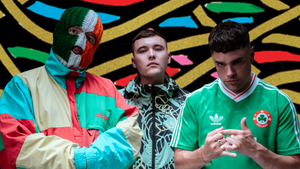Avon And Somerset Police have ended their criminal investigation into Kneecap’s Glastonbury performance, concluding that there was “insufficient evidence to provide a realistic prospect of conviction for any offence”.
In response, the band said that “one element” of the “political policing intimidation attempt” against them is now over. However, the separate investigation into Bob Vylan’s Glastonbury set is ongoing.
The updates from Avon And Somerset Police follow the launch last week of a new artist-led syndicate involving the likes of Massive Attack, Brian Eno and Fontaines DC that aims to help support those musicians who speak out on the conflict in Gaza and, as a result, believe they are subject to “aggressive, vexatious campaigns” by pro-Israel advocates.
Following both Kneecap and Bob Vylan’s performances at this year’s Glastonbury Festival, Avon And Somerset Police announced it had launched a criminal investigation into comments the two bands had respectively made while on-stage.
With Bob Vylan, the investigation obviously relates to the band’s frontman leading the crowd in a chant of “death, death to the IDS” before declaring “from the river to the sea, Palestine will be free”.
However, with Kneecap, it turns out, the focus wasn’t on any specific on-stage events relating to Israel and Palestine, but rather comments made regarding the ongoing criminal case over past on-stage events relating to Israel and Palestine.
Kneecap member Mo Chara is currently fighting terror offence charges after displaying a Hezbollah flag at a previous London gig, despite the band insisting they do not support either Hamas or Hezbollah, both of which are proscribed terrorist organisations in the UK.
That criminal case will return to Westminster’s Magistrates Court next month. Referencing that court hearing during the Glastonbury performance, at one point Mo Chara told the crowd they would “start a riot outside the courts”. But he later told the crowd, “No riots, just love and support, and support for Palestine”.
The main question for the local police was whether or not those remarks constituted an intention by Kneecap to incite a riot. Having consulted with the Crown Prosecution Service, the police force decided there was “no realistic prospect” of proving “beyond reasonable doubt” that that was the band’s intent.
Responding to that decision, Kneecap say that their well received Glastonbury set was “a celebration of love and solidarity” and yet, as they left the stage they walked off into the “creaking scheming sounds of the establishment” as the police publicly announced their criminal investigation.
“Every single person who saw our set knew no law was broken, not even close”, they go on, “yet the police saw fit to publicly announce they were opening an investigation. Why open and publicise an investigation into fuck all? This is political. This is targetted. This is state intimidation”.
After the “media damage” of that big announcement during Glastonbury weekend, they say, the police confirmed to the band that no criminal charges would be pressed in a short email to their lawyers. “There is no public apology”, they conclude, adding, “we will continue to fight, we will continue to win”.
Kneecap argue that they have been on the receiving end of a campaign designed to silence the band because of their on-stage support for Palestine, with critics in the music industry and the political community, as well as pro-Israel groups, seeking to hinder their creative output through show cancellations and legal issues.
Other artists, including Bob Vylan, have likewise claimed they are under attack from certain quarters because of their public support for Palestine and criticism of Israel.
Last week a number of those artists, including Kneecap, announced the formation of a syndicate that aims to provide support for music creators who feel they are being targeted by industry, political or legal groups because of their public comments on the conflict in Gaza. Other artists involved in the syndicate include Massive Attack, Brian Eno and Fontaines DC.
Some of the participating artists wrote on social media, “Because of our expressions of conscience, we’ve been subject to various intimidations within our industry (live and recorded) and legally via organised bodies such as UK Lawyers For Israel”.
They continued, “We’re aware of the scale of aggressive, vexatious campaigns operated by UKLFI - and of multiple incidences of intimidation within the music industry itself - designed solely to censor and silence artists from speaking their hearts and minds”.
They then added, “Having withstood these campaigns of attempted censorship, we won’t stand by and allow other artists - particularly those at earlier stages of their careers or in other positions of professional vulnerability - to be threatened into silence or career cancellation”.
With that in mind, they encourage any other artists who have faced a formal backlash over their support for Palestine, or any artists who have chosen not to speak out in fear of such a backlash, to get in touch.
A Guardian report on the new syndicate honed in on Massive Attack’s support for the initiative and then offered UKLFI a right to reply, given it was specifically mentioned in the statement put out by artists.
It said that it had raised concerns about a recent Massive Attack show after receiving complaints from “Jewish and Israeli audience members” over a performance that “included comparison of Israel’s actions with the Holocaust” and, separately, “images of the former Hamas leader, Yahya Sinwar”. The band explained that that image was part of a digital collage and had been taken out of context.
UKLFI then said “we wrote to Massive Attack to convey” those concerns “and requested that future performances do not repeat these actions. We believe in free speech and artistic expression, however we felt this performance crossed a line and made audience members feel deeply traumatised”.

